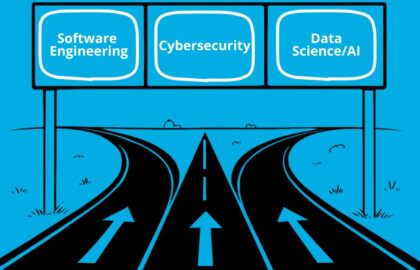A GRC Analyst is responsible for assessing and documenting an organization’s policies and regulations that involve the compliance and risk posture of information assets in the organization.
As a GRC Analyst, you might work on an internal cybersecurity team or for a cybersecurity consulting firm.
Your daily responsibilities as a GRC Analyst could include auditing existing cybersecurity policies and procedures, developing security policies, identifying and analyzing risk, and reporting on regulatory compliance.
What Other Job Titles Are There for This Career?
You might see other job openings in the GRC Analyst career field with titles such as:
- Cybersecurity Compliance Analyst
- Security and Compliance Engineer
- Security and Compliance Analyst
- Cloud Compliance Security Engineer
- Governance and Policy Analyst
- Third Party Compliance Analyst
How Much Can You Make as a GRC Analyst?
GRC Analysts in the United States can make between $34,000 and $212,000, with the average salary at around $97,000. This doesn’t include sign-on or annual bonuses, stock options, or other compensation, which means a career as a GRC Analyst can be a very lucrative one.
Compensation influencers for this role depend on the company, geographic location, experience level, specialization, and industry.
Do You Need Certifications?
There are no specific cybersecurity certifications requirements to get a job as a GRC Analyst; however, many people study for the CompTIA Security+, the Cloud Security Alliance’s Certificate of Cloud Security Knowledge (CCSK), or the ISACA Certified Information Security Auditor (CISA).
As you gain more experience in a GRC career, you may also study for more privacy-focused certifications like the Certified Information Privacy Professional (CIPP) from lAPP. One Trust also has a GRC Professional certification that is popular amongst GRC Analysts.
Do You Need a College Degree?
There are no college degree requirements for this career.
Many career changers find GRC Analyst to be an easy cybersecurity career to transition into because there are no strict requirements on certifications or college degrees. If you do want to pursue your college degree, then a degree in cybersecurity or business can be helpful in helping you land a GRC Analyst position after graduation.
Do You Need Technical Skills to Get a Job as a GRC Analyst?
Technical skills or a background in information technology are not required for many GRC Analyst roles. However, you will benefit from building up your technical understanding (especially as it relates to security controls and their implementation) because you will work with technical teams across an organization, including the incident response, security operations, and penetration testing teams.
Do You Need Experience to Get Your First Job as a GRC Analyst?
Experience is not required for your first job.
In fact, many people just like you have successfully changed careers to become GRC Analysts, including a young woman who used to sell swimming pools for a living!
Are There Opportunities for Internships?
There are some internships available for this role depending on the company; however, most people are hired directly into full-time positions as GRC Analysts instead of starting with internships. Do know that internships are paid or unpaid and many college students earn credits for working internships.
How do I become a GRC Analyst?
Step 1 is to determine the type of industry you would like to work in as a GRC Analyst.
Would you like to work in healthcare, retail, the energy industry, or another industry entirely? Having a handle on this will help you determine what regulations and frameworks to focus on.
For example, if you choose to work with companies in the energy industry, then Step 2 is to identify the frameworks, standards, and regulations in use in that industry. One example would be the NERC standards, which were created by the North American Electric Reliability Corporation.
Step 3 is to review those standards, frameworks, and regulations and identify any example case studies of their application, and any financial consequences a particular company faced for not being compliant.
Having this information at the ready in a job interview can be beneficial because you can discuss standards, frameworks, regulations, and case studies with the hiring manager to show you understand the complexities of the job and the industry.
Step 4 is determining if you want to pursue a certification or college degree prior to applying for GRC Analyst jobs.
There are many cybersecurity certifications, college degree programs, and bootcamps out there, so it’s important to narrow down your list and then conduct deeper research to determine what will work best for you.
How Do You Find a Job as a GRC Analyst?
The best way to get any cybersecurity job is to network on social media with people working in the job you want, and to build your personal brand.
Building your personal brand means as you are learning, you are posting about what you are learning on social media. This helps show recruiters and hiring managers your passion for GRC. (There is a lot more to learn about building your brand in cybersecurity; check out this LinkedIn article “How Do You Build a Strong Cybersecurity Brand?” for more information.)
You can also find job openings on LinkedIn, Indeed, CyberSN, and other job board websites. Be sure to learn how to write a resume and a cover letter before you begin applying for jobs, and know that you have to customize both documents for every job application you submit.
Should You Become a GRC Analyst?
A career as a GRC Analyst might be good for you if you like to solve puzzles or analyze and solve problems. It might also be a good career choice for you if you have solid skills with effectively communicating information to a variety of individuals, because you will be working with multiple teams and stakeholders across whichever business you join.
Working as a GRC Analyst can be a rewarding career both financially and in the sense that you will play a critical role helping businesses build better cybersecurity programs to keep sensitive information safe.



